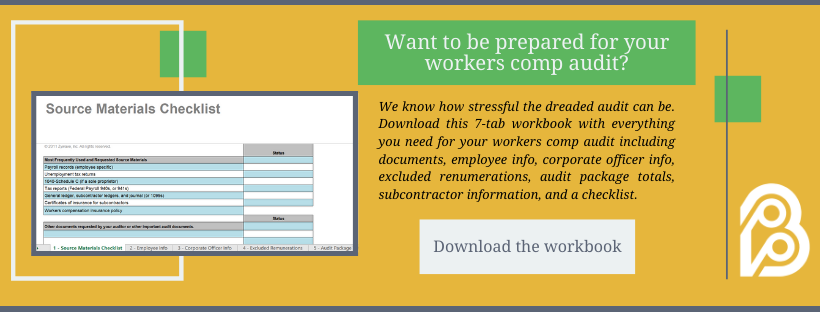What is a Workers’ Compensation Test Audit?
If you have workers’ compensation, you are probably familiar with the dreaded annual workers’ comp audit. But getting notified of a “test” audit may stop you in your tracks.
You may be thinking: “What even is a test audit? Isn’t the one terrible audit I have to go through enough? You’re telling me I need to do another one?!”
We know, we know: it’s annoying. But just like regular workers’ comp audits, test audits are unavoidable, and actually serve a good purpose.
At Berry Insurance, we’ve navigated our fair share of regular and test audits alongside our commercial insurance clients.
So in this article, we’ll explain what a test audit is and how it will affect your business, so you can be prepared if it happens to you.
Table of contents:
- What is the WCRIMBA test audit?
- Will I be test-audited?
- What do I need for a MA test audit?
- How does the MA test audit work?
What is the WCRIBMA test audit?
In case you aren’t familiar with the standard worker’s comp audit, let’s begin with a refresher.
At the start of your policy, your worker’s compensation premium is estimated based on your projected exposures for the policy term. When the policy expires, you’ll be asked to provide your actual exposures for the policy term. This is your audit.
It is designed so you do not overpay (or underpay) for your coverage. In other words, it makes sure you only pay for the exposures you actually had.
So what’s the deal with the test audit?
In 2019, The Workers’ Compensation and Inspection Bureau of Massachusetts (WCRIMBA) began conducting test audits to “verify the accuracy of audits of payrolls and other bases of premium on policies of workers’ compensation insurance and employers’ liability insurance.”
Essentially they are auditing their own audit process!
The workers’ comp audit process can be complicated, and it is often inaccurate, so the test audit is an attempt to clean up the process to improve accuracy in annual audits.
According to the WCRIMBA, the purpose of the test audit is:
- To monitor the accuracy of the audits of the insurance companies; to verify that classifications, rates, rating plans and other rating values are accurately applied
- To ensure that the rules contained in the Massachusetts Workers Compensation & Employers Liability Insurance Manual have been applied correctly
- To assure that statistical data used for the calculation of rates and individual experience rating modification factors is properly reported to the WCRIBMA
- To improve audit proficiency through the evaluation of a carrier’s auditing practices
Will I be test-audited?
Just like any company can be audited, any company can be test-audited.
Unfortunately, whether or not you will get test-audited will remain a mystery until the state notifies you they will be coming. The WCRIBMA will choose policies of all sizes and industries to test-audit each year.
If you do get test-audited, you will still need to complete your annual audit in addition to the test audit.
What do I need for a MA test audit?
Just like a regular audit, tests audits require a lot of paperwork.
The WCRIBMA recommends you have the following records available for your test audit:
- Payroll Journal which shows YTD Gross Payroll, Overtime, Bonus, Section 125 Deductions, etc. by each employee
- MA Unemployment Insurance Tax Returns and/or 941s filed during the audit period
- All 1099s issued to contract labor - including certificates of insurance
- Cash Disbursement Journal or General Ledger for the audit period Business Income Taxes; ex. Schedule C, 1120, 1120S, 1065 Information pertaining to a sales breakdown for products/services provided If you were engaged in any OCIP (wrap-up) jobs, then certified payrolls are required
Need help preparing for your audit? Read this article: 5 Steps to Get Through Your Workers Comp Audit.
How does the MA test audit work?
If selected for a test audit, the WCRIBMA will notify you of when they will be conducting the audit.
The audit will either be done in person, over the phone, or electronically. Regardless of the method, the auditor will compile information from the documentation you provide, then enter it into their software to create the audit worksheets, which calculate the audited amount.
You can expect this process to last 2 to 3 hours, although the time may vary based on the complexity of the audit.
Here’s the good part: According to the WCRIBMA, “If the results of the test audit produce an additional premium, the carrier is not permitted to bill the additional premium on the test audited policy. If the results of the test audit produce a return premium to you, the carrier is required to return the appropriate premiums.”
Handle any audits with ease
We know there is nothing fun about a workers’ compensation audit. But, since you have to do it, you might as well do your best to make it less painless.
And since the test audit is a lot like an audit, the preparation should be pretty much the same for both.
So whether it be the test audit, or the actual thing, we can help you prepare. For some tips and resources about how to navigate your audit, read this article: 5 Steps to Get Through Your Workers Comp Audit


.jpg)
